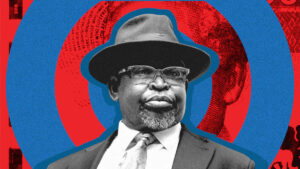The ‘parasites’ draining South Africa at your expense

Renowned political economist Moeletsi Mbeki has offered a scathing critique of some African political elites.
He argues that a focus on personal gain and the enrichment of their immediate circles inadvertently and consistently perpetuates poverty across the continent, including in South Africa.
In an interview with BusinessTech, Mbeki contends that the actions and priorities of these elites directly hinder broad-based development and maintain a system where they benefit at the expense of the majority.
This theme is explicitly outlined and dissected in his book, Architects of poverty: why African capitalism needs changing.
Mbeki draws a stark contrast between the motivations of ruling elites in Africa and those in Asia, arguing that Asian elites are primarily driven by the desire for economic growth and the upliftment of their populations.
To achieve this, Mbeki said that they strategically “suppress the consumption of the capitalist class and they have to suppress the consumption of the middle class and of the professionals.”
This suppression of consumption allows for significant investment in crucial areas such as “high quality education…high quality health care, high quality housing care” for the masses.
This leads to a skilled and productive populace, as notably exemplified by China becoming the “factory of the world,” over the past three decades.
Conversely, Mbeki asserts that “the African elites, including our African elite in South Africa, they drive their own consumption.”
This focus on personal enrichment and maintaining a high standard of living for themselves and their close networks comes at the cost of investing in the essential needs of the wider population.

The results and what needs changing
The result, according to Mbeki, is “a very poorly educated population, a very poorly housed population, and very low health standards amongst the mass of the African population”.
Mbeki suggests that this pattern of prioritising elite consumption over mass development creates a cycle of underdevelopment and poverty.
The failure to invest adequately in education, healthcare, and infrastructure for the majority hinders the creation of a skilled and healthy workforce capable of driving sustainable economic growth.
This lack of broad-based development, in turn, can perpetuate a system where the elite maintain their power and continue to extract resources.
He describes this dynamic as a form of “semicolonial exploitation of the mass of the population”.
Turning specifically to South Africa, Mbeki analyses the role of the ruling African National Congress (ANC), which he identifies as “a party primarily is a party of the African middle class.”
He argues that after gaining power, the ANC focused on developing this core constituency through policies like Black Economic Empowerment (BEE), preferential procurement, and employment equity.
While these policies were framed as addressing historical injustices, Mbeki believes they primarily serve to enrich “a small political elite within the ANC.”
He contends that BEE “does not create new wealth. It does not create new entrepreneurs” but rather incentivises becoming “parasitic on the existing companies and at the same time to become parasitic on the state.”
Furthermore, Mbeki highlights the disproportionately large public service wage bill, where over 30% of the budget is used to satisfy the immediate employment demands of less than 4% of the population.
He argues that this excessive expenditure “uses the tax system to tax the private sector and transfers those resources to the state.”
“It then redistributes those resources as highly inflated salaries to the middle class itself that controls the state,” draining crucial resources, said Mbeki.
The crucial resources are from the private sector that could be reinvested in productive activities and job creation.
This situation, where the “middle class screams off the profit from the private sector and turns that into its own salaries,” directly impedes economic growth and the reduction of poverty, says Mbeki.
Overall, Mbeki’s analysis analysis reveals a system where the prioritisation of personal consumption and the enrichment of a select elite.
Coupled with policies that favor this group, he said that this leads to underinvestment in the broader population and hinders sustainable economic development.
This self-serving approach, in Mbeki’s view, effectively perpetuates poverty as a consequence of choices made by those in power.





















